Part 1: Alibaba Unofficial Guide, Finding Suppliers
Alibaba, for better or worse, is the starting point (and often only point) for most individuals looking for products to import. There's a temptation to equate Alibaba with other selling platforms we in the West are familiar with like eBay. But Alibaba is its own very unique monster and I'll outline some basic tips and strategies for getting the most out of Alibaba.
Alibaba is Not Alibaba
Since their IPO, Alibaba has become more well known in the west. It's an important distinction to know that the Supplier marketplace for importers of Alibaba makes up a very small portion of the actual company Alibaba. Taobao is the real engine that fuels Alibaba and it just happens to fall under the parent company's name, Alibaba.
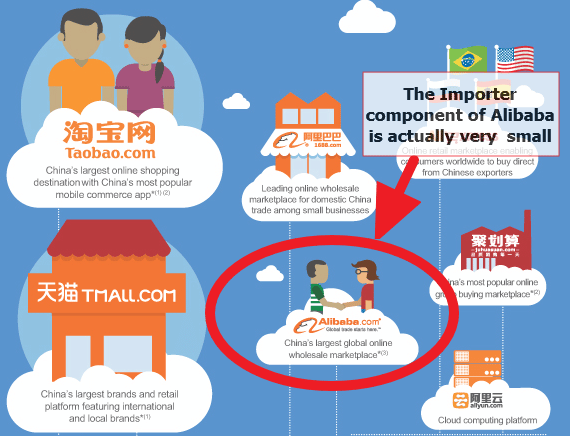
Alibaba Gold Suppliers
Alibaba has levels of membership including Free Unverified subscriptions and the premium Gold Suppliers. A Gold supplier pays a premium for increased ranking, marketing services, etc. As per Alibaba:
Gold Supplier is a premium membership for suppliers on Alibaba.com. Members are provided with comprehensive ways to promote their products, maximizing product exposure and increasing return-on-investment.
This is important to distinguish. An Alibaba Gold Membership is simply a paid version of their membership which has little bearing on legitimacy or quality of products. Another point worth mentioning with Alibaba is that it is entirely subscription based and Alibaba does not collect a percentage of sales. This means that you are free to communicate with Suppliers outside of the Alibaba platform.
In fact, I can sign up as a Gold supplier with my account by simply paying the $1399 fee (as seen below). On a side note, the day after I clicked through to this page, I had a call from Hangzhou China with a representative from Alibaba asking me if I was really interested in becoming a Gold Supplier.
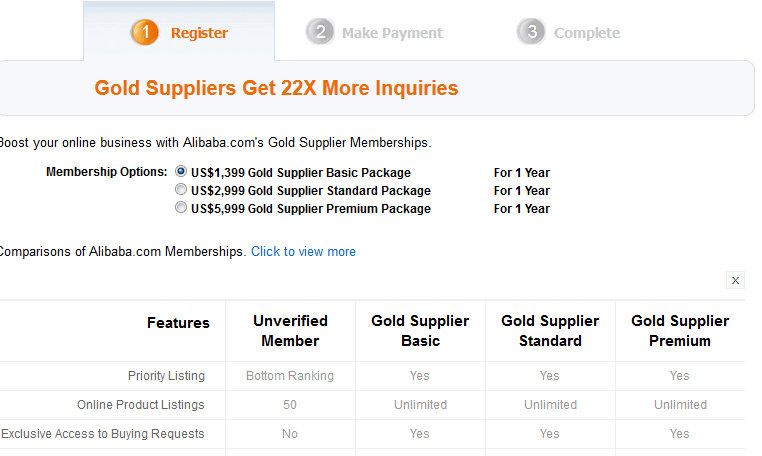
In my experience, Gold suppliers are in fact very likely legitimate companies and your chances of having your money stolen from one are very low. However, the point cannot be stressed enough that this will have no reflection on the quality of the products you receive. If Alibaba regulated product quality to any serious standard they would alienate a very large portion of their customer base in China.
Step 1: Searching for Products
Looking for products on Alibaba is as simple as searching for the name of the product. It has an interface like we're very much accustomed to with eBay or other market places. In this example, I am going to use the example of searching for Educational Carpet for Kids: basically, this is just a normal rug with an educational motif like an alphabet, world map, etc. See some other examples on Amazon here.
How Search Rankings Are Determined
When searching on Alibaba it's important to keep in mind how search rankings are determined. Factors include:
- Whether the Supplier is a Gold Member
- How long the Supplier has been a Gold Member
- Paid search listing enhancements
- Price
- Relevancy
Being a paid Gold Member and how long a Supplier has been a gold member is one of the most critical ranking factors. This isn't to say that the top listings for a product aren't necessarily relevant and inexpensive, but it's by no means a guarantee.
Search Filter Tip #1: Sort by Suppliers
I searched on Alibaba for Kids Educational Carpet and was returned over 1400 different products. So here's the first tip when searching for products on Alibaba: sort your search results by Supplier, not products.
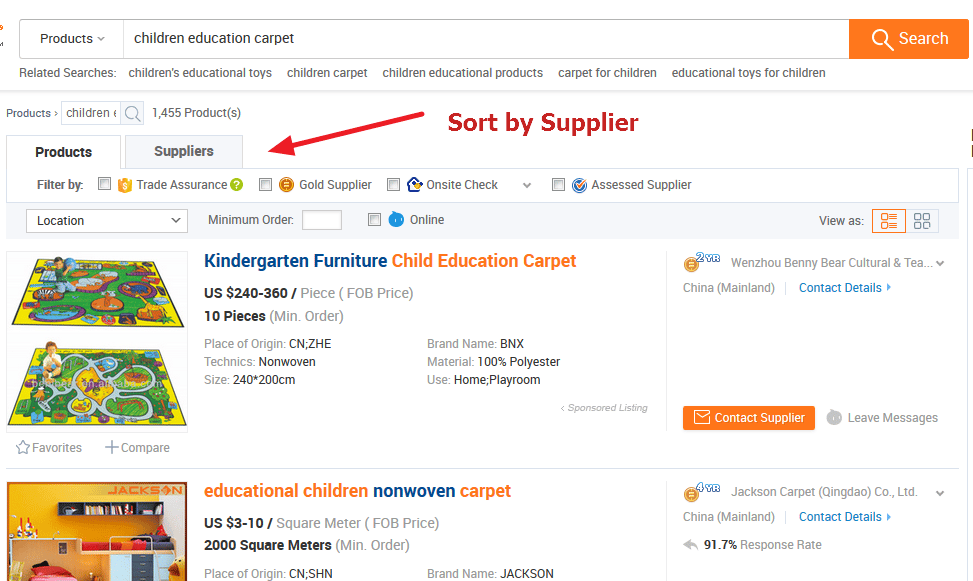
Alibaba will tend to match you any product that is at all related to your product. In my case, it will return to me hundreds of listings for general throw rugs, which are very different than kids educational carpet. Worse, it will often return dozens of irrelevant products from the same irrelevant Supplier.
Search Filter Tip #2: Restrict to Mainland China
Next, select your location as China (Mainland) only. Alibaba is open to Suppliers from all over the World and in our search, we were returned Suppliers from Turkey, Chile, and Hong Kong. Turkey and Chile we definitely do not want. Hong Kong companies can sometimes be OK, but keep in mind, that very little manufacturing is done in Hong Kong and many Hong Kong companies are simply trading companies on Alibaba.

Search Filter Tip #3: Restrict to Gold Suppliers
Finally, you should restrict your search results to Gold Suppliers. As we discussed before, Gold Suppliers are not necessarily indicative of product quality or as a ranking system for the best Suppliers. However, it does differentiate between the serious Suppliers and the guy in YiWu, China setting up a Supplier Page just for fun.
Step 2: Narrowing Your Search Down to 5 Suppliers
We've now sorted our search results by the following:
- Suppliers only (not products)
- Only Suppliers in Mainland China
- Only Gold Suppliers
However, you'll still likely find you have dozens, if not hundreds or thousands, of Suppliers to choose from. You can be overwhelmed, but ultimately we want to narrow down a list of 5 Suppliers or so.
You'll notice an interesting stat beside every Supplier: their response rate.
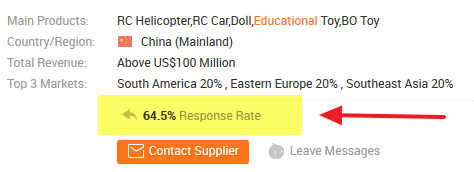
Suppliers are often very selective on who they respond to, as I talk about in more detail in the article Begging a Supplier to Do Business. You can expect to get a response about 50-70% of the time. So even if we contact 5 Suppliers, we may only get 3 or 4 responses.
Narrowing Search Results Tip #1: Find the Products You Need
The first step in narrowing our list down to 5 suppliers is to, of course, determine what suppliers have our products.
You may have a very exact product in mind that allows for no variation. However, the chances are you have a product that allows for some style variation (especially if you're following my Niche Selection Criteria outlined in my eBook) such as in the case of my children's education carpet. Carpets come in different thicknesses, sizes, and decoration. Try and find a minimum of 7 Suppliers that meet our criteria above (Gold Suppliers in Mainland China) and make a note of their Alibaba URL (either using an Excel workbook or bookmarking them). After this, we can eliminate Suppliers if they are too big/small for us, if they are in very small cities, and/or if they are trading companies or not.
Narrowing Search Results Tip#2: Size and Location
- Where in China are the Suppliers located? (I want to avoid really small cities)
- How big is the Supplier? (I don't want to be their smallest client and I don't want to be their biggest client)
When you're on the search results page you will notice other interesting bits of information: total revenue and the fact that many Suppliers have the name of Chinese cities in their name.
With a company of $50 million or more, you are approaching chopped liver territory to them. They will likely deal with some very big clients, and therefore you will have almost no negotiating power (either for price or other servicing). They may also not accept small orders. However, they will likely have a fairly high quality product.
I generally prefer to deal with companies under $50million, ideally so I can form at least some relationship with the owner (even if my day to day contact is with an account manager) and so my orders mean something to them. In these cases I can negotiate prices better and I can lean on my relationship with the owner to get preferential treatment from time to time.
Using a tool like Import Genius, you can really get a sense of the size of a company. For the Supplier Jackson Carpet (Qingdao) listed above, I did a quick search on Import Genius for the company. The results yield some interesting things:
- Import Genius returns over 500 records for Jackson Carpet Qingdao. They're almost certainly a legitimate company.
- Jackson Carpet Qingdao sells to some very large companies including Costco. What are the chances a company selling dozens or hundreds of containers to Costco alone is going to be dying to get my business for an order of 50 pieces or so? I'd probably try to find a slightly smaller Supplier.
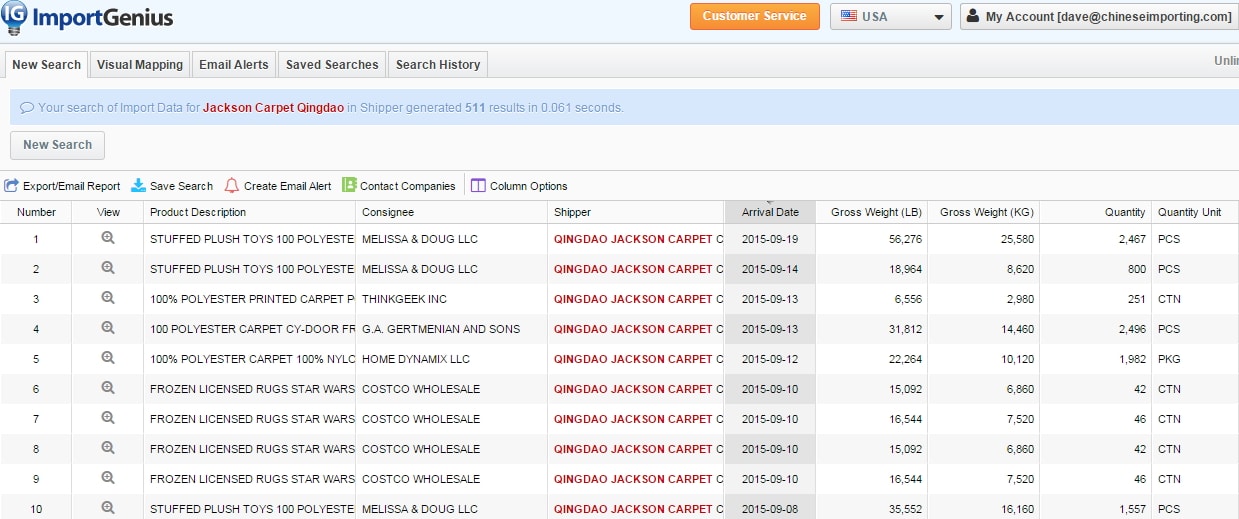
Finally, the location of the Supplier is of importance. Generally, I like to avoid Suppliers from small cities in the middle of nowhere. These Suppliers are often harder to deal with and I don't recommend it for new importers (although they often have good prices as well). Most Suppliers are required to have the name of their city in their business name.
If you're unsure of the size of the city, pull up a list of hotels on TripAdvisor for that city. If there are a multitude of English reviews for Hotels and Attractions in that city, you at least know that a foreigner has traveled to that city at some point in its history!
Narrowing Search Results Tip#3: Do you want a Trading Company or Factory?
There are essentially two types of suppliers in China: Factories and Trading Companies. Trading companies can be thought of like distributors/wholesalers in the West. They work with several factories and help market their products to overseas buyers (they are more international business savvy). My unofficial estimate is that 70% of companies on Alibaba are trading companies and 30% are factories. There's pros and cons to using a trading company, with the main con being that their prices are higher.
Trading Company Pros and Cons
- PRO: Have staff with better English speaking skills with better understanding of foreign buyers
- PRO: Larger product selection and can help consolidate your shipments
- PRO: Often (but not always) have better product quality
- PRO: Can accept lower MOQs
- CON: Higher prices
- CON: Difficult to have a product customized
If you have a very particular item you want imported (and do not want to import a wide array of products), can tolerate high MOQs, and preferably have some importing experience, factories are your best choice. Otherwise, trading companies are the way to go.
You can identify a factory normally because they have the word factory in their name (duh!). They'll have a lot of photos showing pictures of their factory and machinery and have a limited product assortment. Trading companies may have the word “Trading Co.” in their name and will have hundreds of products on their site on Alibaba and show pictures of their offices and giant showroom.
Your Final List of Five Suppliers and Contacting Suppliers
At this point you should have a list of approximately five suppliers who you can now contact to get quotes for the products you are interested in.




Incredible post and blog David. Did you ever post, “Contacting, Negotiating and Ordering samples from Suppliers?”
I look forward to that read.
Hi,
That should be up in Part 2 :)
Thanks for the very detailed article, usually the sourcing part is never talked about in all “Amazon tutorials”.
Do you have any recommendations about which countries is the best suited for sale?
Keep the good work,
Paul
Hi Paul,
In terms of selling products, any country is suitable for selling products from Alibaba :) The only thing that changes is the type of products and the method of selling.
Thanks for the helpful article, my understanding of Alibabi is quickly improving.
Thanks for the article, very instructive
Great article it has help me to understand what the heck is Alibaba that shows up in my E-mail constantly. You are doing a great service to all of us newbies.
I’m retired and make my living selling novelties and small tokens to be given at small lunches etc.
I find many such items in Alibaba but usually they have minimum orders of 500 pieces or boxes but never mention homa many items are in each piece or box. I assume hundreds or thousands. I can’t afford to buy that many and found one factory that sell a candle which is classed as 1.4G firework and will sell 100 units but I have no idea of how to get them to the US. I read your article on FF but I assume they would not bother with something so small. I have been told a courier would ship it but fed ex has quoted $498 for a product that cost $40 and weighs less than 3 pounds in a box 12″x10″x5″. I have been getting my items via epacket but they will not ship 1.4G products.
Do you have any idea how I could export this package in a cost effective manner? I have been told china post or EMS will ship it? How about ocean fright for this small package? I know people in the US that will send small packages to their countries in South America or the Philippines so it should work the other way?
Thanks for all your info and hope you can orient me in the right direction.
Keep up the good work.
Ocean freight is going to cost you a lot more than $498 after all the fees. I’d ask the Supplier for a quote for air – they probably get better rates than you. $200 is probably more reasonable.